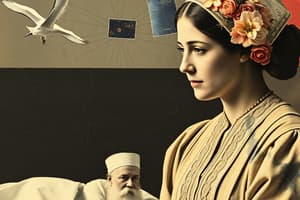Podcast
Questions and Answers
Where was Florence Nightingale born?
Where was Florence Nightingale born?
- Rome, Italy
- Paris, France
- Florence, Italy (correct)
- London, England
What is Florence Nightingale often credited with improving in hospitals?
What is Florence Nightingale often credited with improving in hospitals?
- Hospital architecture
- Sanitation and hygiene standards (correct)
- Legal frameworks
- Hospital food quality
Where did Nightingale learn the principles of nursing and hygiene?
Where did Nightingale learn the principles of nursing and hygiene?
- Berlin (correct)
- Paris
- Munich
- London
What did Florence Nightingale's parents expect her to do?
What did Florence Nightingale's parents expect her to do?
During which war did Florence Nightingale manage a group of nurses to treat wounded soldiers?
During which war did Florence Nightingale manage a group of nurses to treat wounded soldiers?
What aspect of patient care did Nightingale and her team significantly improve during the war?
What aspect of patient care did Nightingale and her team significantly improve during the war?
Flashcards are hidden until you start studying
Study Notes
Florence Nightingale, born on May 12, 1820, in Florence, Italy, was a pioneering English nurse, statistician, and social reformer. She is often referred to as the founder of modern nursing and is credited with improving the sanitation and hygiene standards in hospitals, thereby saving millions of lives.
Growing up in a wealthy family, Florence Nightingale was homeschooled by her father and was expected to marry and raise a family. However, she felt a calling from God to help the poor and the sick. Despite her parents' disapproval, she pursued her passion and became a nurse. Nightingale studied in Germany, where she learned the principles of nursing and hygiene, and later went to Paris for additional training with the Sisters of Mercy.
In 1853, Nightingale returned to England and became the superintendent and manager of a hospital for "gentlewomen" in London. When the Crimean War broke out in 1854, the British were unprepared to handle the number of sick and injured soldiers. Nightingale, using her knowledge and experience, was asked to manage a group of nurses to treat the wounded soldiers. She arrived in Constantinople on November 4, 1854, and faced resistance from the doctors who were skeptical about working with female nurses. However, as the number of patients grew, they realized the importance of Nightingale and her team. They brought supplies, provided nutritious food, cleaned the hospital, and offered individual care, which significantly improved the patients' health.
Nightingale was known for her innovative techniques, such as using a lantern to visit patients at night. Her dedication and hard work were instrumental in reducing the mortality rate in the military hospital from 60% to 2.2%. After the war, she continued her work, establishing the Nightingale Nursing School in 1860, which was the first nursing school in the world and played a major role in transforming nursing from an unrespected occupation to a respectable profession.
In addition to her nursing work, Nightingale also made significant contributions to the field of statistics by creating a pie chart, which is now widely used in data analysis. She was a strong advocate for women's rights and social justice, and her work continues to influence the healthcare industry and the world today.
Studying That Suits You
Use AI to generate personalized quizzes and flashcards to suit your learning preferences.




